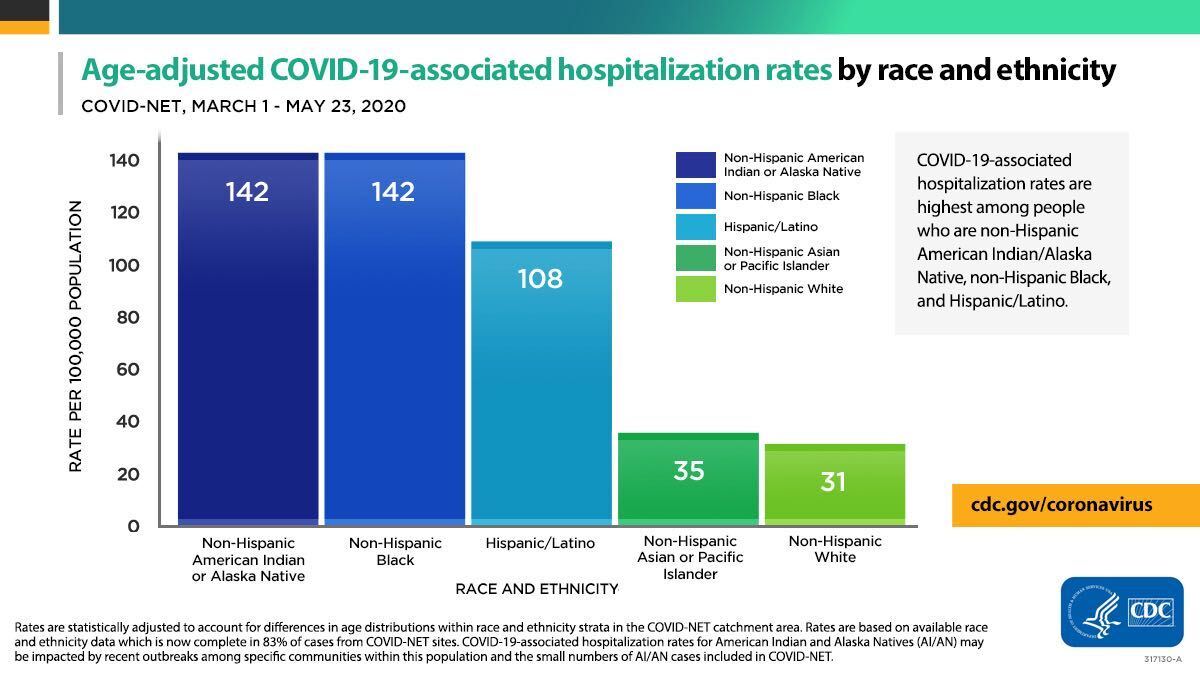Vanessa Lamers, MPH, MESc, is the Assistant Director of Performance Management and Quality Improvement, Public Health Foundation
,
Racism is a public health issue, with significant impacts to health and well-being.
Public health and healthcare professionals know firsthand the impacts that long-standing discriminatory structures and institutionalized racism have on health outcomes. This has been particularly pronounced throughout the COVID-19 pandemic, as illustrated by the below graphic from the Centers for Disease Control and Prevention (CDC).

What is the role of public health in dismantling historical barriers, embedded segregation, and legacies of structural racism in our communities? Health professionals are at the forefront of efforts to achieve health equity, but we will only be successful if we focus as individuals, teams, and organizations to address the system underlying these disparities and the structural racism of our communities.
To build skills, knowledge, and learning for health professionals, PHF has curated a set of five high quality, recent, and complementary trainings. Each of these trainings are roughly one hour and are available through the
TRAIN Learning Network:
This CDC Preventive Medicine Grand Rounds presentation features Dr. Camara Jones’ work on the impact of racism on the health and wellbeing of the nation. In this presentation, Dr. Jones discusses how to address structural and historical causes of health inequality, build a health equity “lens” into public health work, and facilitate health systems’ effort to achieve health equity for all.
Using engaging videos and plain language, this course defines and discuses health equity, social determinants of health, and environmental justice. Although some data and examples are specific to Colorado, this training is an excellent introduction to these concepts, and would be appropriate for individuals without a background in public health or medicine.
While many might view an experience with trauma as a single event, sociologist Dr. Thompson-Miller argues that the trauma of racism has never ended–or subsided–for African-Americans, and has created a multigenerational traumatic experience. Drawing connections from Emmett Till to Trayvon Martin, Dr. Thompson-Miller discussed the origins and current state of “Segregation Stress Syndrome,” as well as ways clinicians can begin to make connections between historical trauma and the health outcomes of Black Americans today.
4)
Working Across Government to Advance Health and Racial EquityDecember 2017 Webinar Presentation
Host: Government Alliance on Race and Equity, the National Collaborative for Health Equity, and NACCHO’s Health Equity and Social Justice Committee
Speakers: Shawna Davie, Matias Valenzuela, Jordan Bingham, Jonathan Heller
This is the second part of the four part “Advancing Health Equity in Local Health Departments” webinar series. This webinar addresses the importance of working across government, and underscores reasons why being explicit about racism is key to advancing health equity. Case studies from King County, Washington and Madison/Dane County, Wisconsin are used to demonstrate this importance.
This video presentation discusses the roles institutions have played in fostering, exacerbating, and perpetuating racism and other forms of oppression, and lists the ways that institutions can work with neighborhoods and communities to amplify their inherent power to health together. Dr. Maybank discusses a neighborhood place-based approach, which uses evidence-based interventions to provide coordinated health promotion services, clinical services, and community resources to increase community access to goods and services and close coverage gaps. It also addresses coordination and multi-sectoral partnership building with other agencies to advance the health equity agenda.
PHF wants to thank these and all the course providers for their high quality trainings and excellent presentation of information crucial for our pursuit of health equity.
The TRAIN Learning Network provides easy access to content from thousands of reputable training providers. If you have a training or course that should be added to this list, email Vanessa Lamers at
[email protected].